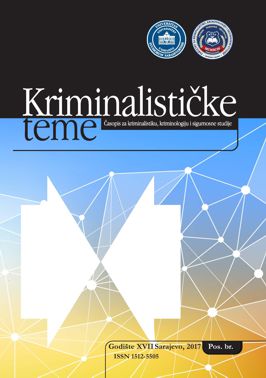ASISTENCIJA ŽRTVAMA TRGOVINE LJUDIMA KROZ PRIZMU DRŽAVNOG REFERALNOG MEHANIZMA U BOSNI I HERCEGOVINI
ASSISTANCE TO THE THB VICTIMS IN BIH THROUGH PRISM OF NATIONAL REFERRAL MECHANISM
Author(s): Samira HunčekSubject(s): Criminal Law, International Law, Human Rights and Humanitarian Law, Criminology, Victimology
Published by: Fakultet za kriminalistiku, kriminologiju i sigurnosne studije Univerziteta u Sarajevu
Keywords: trafficking in human beings (the THB); the THB victims; protection; assistance; referral mechanism; financial means;
Summary/Abstract: Reason for writing and research problem(s): Bosnia and Herzegovina faced the THB phenomenon in 1990s as country of the destination, while nowadays Bosnia and Herzegovina is the country of origin, transit and destination too. Majority of the THB BiH nationals victims are children. The efficient response to the THB, alongside the prosecution, must encompass an overall and appropriate THB victims’ protection. An adequate protection, starting with identification and sheltering in a safe house, provides for the victims to recuperate from effected physical and mental health issues and enables reintegration in to community and social processes. This is one of the most complex and demanding steps and tasks in combatting the THB. BIH Referral Mechanism is complex, thus we must be aware of several issues. Aims of the paper (scientific and/ or social): The aim of this paper is to map the current state of play, shed a light on advantages and disadvantages of the existing NRM in providing assistance to the THB victims in BiH so that we have better indicators and indications on where and how to improve it, should it evidence required. Methodology/Design: In the making of the work being carried out comparative analysis of conceptual and analytical institutional framework with a qualitative analysis of theoretical and methodological approaches through the prism of referral mechanism in identifying and assisting the victims of trafficking. Research/ Paper limitation: There is a vast number of competent institutions, at all levels of government, and civil society organisations that are parts of the Mechanism, each respectively given specific tasks in protecting the THB victims. However, in practice, the elements are either insufficiently, or not at all, involved in processes of identification and/or victim assistance. One interpretation of such condition may be drawn from the sheer multitude of the RM elements, which opens grounds to flaws in network interrelationship, coordination and unified interpretation of the competencies given. The process of the THB victims’ protection and assistance, regulated by numerous laws, bylaws and other pertinent documents, is lengthy, very demanding, and requires timely, coordinated and focused activities. Securing financial resources for adequate protection, rehabilitation, re-socialization and reintegration of victims of trafficking is an evident problem. Furthermore, there is an issue of relevant institutions at all levels that are inadequately cognizant. Results/ Findings: Since Bosnia and Herzegovina is the country of origin, transit and destination, and at the same time in accordance with a number of institutions that play an important role in assisting the victims of trafficking should be carried out systematically mapping potentially accessible services, such as counseling, vocational training, initiatives for the reintegration of victims trafficking.
Journal: Kriminalističke teme – Časopis za kriminalistiku, kriminologiju i sigurnosne studije
- Issue Year: XVII/2017
- Issue No: 5
- Page Range: 116-139
- Page Count: 24
- Language: Bosnian, Croatian, Serbian

